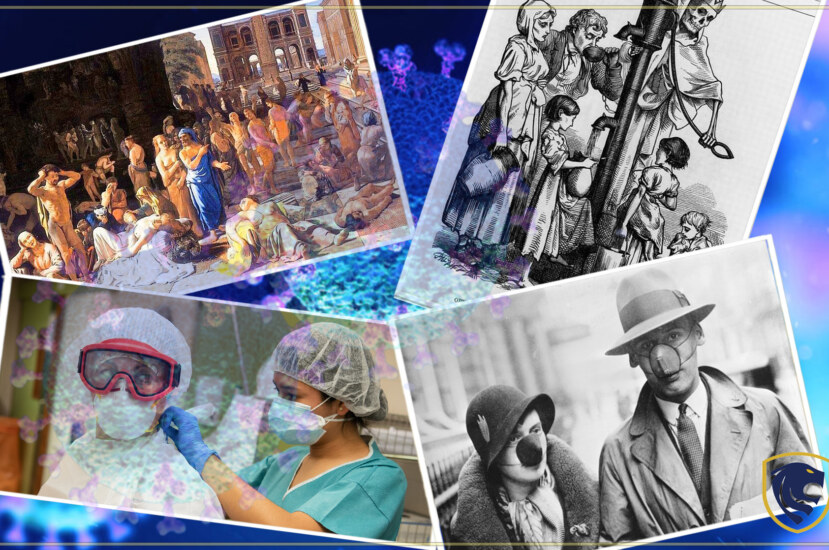Pandemics have befallen on humankind time to time, throughout the history. Pandemic is an outbreak of an infectious disease that can be spread across the country or the whole world. An epidemic differentiates from a pandemic as it spreads among a community at a particular time. In the contemporary world likelihood of spreading a pandemic has been increased due to the globalization and resultant increased global travel and integration of people. Pandemics obviously bring about social, political, economic changes to the societies. There have been notable pandemics that have changed the world history.
Plague of Athens
Plague of Athens is the first ever recorded pandemic in world history. In 430 BC, infectious disease afflicted the city of Athens. An estimated number of 75,000 to 100,000 people, that is a quarter of the population of Athens, succumbed to the pandemic. At the time Athens was at war with another powerful city ‘Sparta’. Both the war and plague brought plight on people. Thucydides was an historian during this period and he himself contracted the disease but was able to survive. According to him this infectious disease arrived from Ethiopia and passed through Egypt and Libya into the Greece and spread throughout the wider Mediterranean.
Thucydides states that plague resulted in a distortion of human morals. People became indifferent to law and religion as they were uncertain about their lives. People were unwilling to care for the sick, as they feared catching the highly contagious disease. The piety towards gods didn’t help them escape the disease, so people lost faith in god. The plague resulted in breakdown of Athenian society resulting in a change of the balance of power between citizens, because many of the rich died and their fortunes were inherited by remaining relatives of the lower class.
The outbreak caused huge damage to Athens. Athenians political strength had declined and high spirits of their armies and citizens had fallen sharply. Ultimately Athens got defeated by Sparta and ended being a major power in Ancient Greece.

Pandemics That Changed The World History, Plague of Athens
Black Death
The recorded number of deaths due to Black Death estimated to be 75-200 million people, making it to be the most fatal pandemic in the human history. Approximately, 30 percent to 60 percent of the European population, and about one-third of the population in the Middle East lost their lives due to this pandemic. This pandemic originated in Western Eurasia and North Africa and it prevailed from 1346 to 1353.
The impacts of this plague, as recorded in history are significant. Death of so many labourers left many lands uncultivated. That was devastating for the landowners. Due to the shortage of labour, landlords had to replace labour services with wages or money rents. And the wages of labourers had to be increased. In other words, the authority they maintained over labourers was reduced, thus bringing in changes to the rigid stratification of the society.

Black Death
In art works like poetry, paintings, and sculpture the psychological effects that Black Plague left on people can be seen as themes have often been death and afterlife. People developed a preference towards mysticism, which resulted in the Roman Catholic Church losing the monopoly they exercised over people. Jews were blamed for the spread of Black Death, it led to the intensification of Anti-semitism throughout the Europe. A wave of violent massacre of Jews followed this plague.
Cholera Pandemic
According to numerous accounts, cholera had existed in India since ancient times and originated in the warm and blackish water of Bay of Bengal. Seven recurrences of cholera pandemic are recorded in the past 200 years. The Cholera outbreak in 1817 marks the first reported pandemic. Initially it spread throughout the Asian countries such as Myanmar Thailand, China and Indonesia. Later the disease reached European territory, Oman, Syria, Turkey and also Southern Russia.
The second cholera pandemic struck the world in around 1829 and its origin too is believed to be India. The disease spread in London in 1832, in the middle of the Industrial revolution and 7000 people died of cholera. That same year outbreak began in New York and at the peak of the plague, 100 people died daily due to the disease. The third pandemic which lasted from 1852 to 1859 was the most fatal. It ravaged Asia, Europe, North America and Africa. Great Britain alone lost 23000 lives in 1854.

Pandemics That Changed The World History, Cholera Pandemic
The fourth (1863-1875) and fifth (1881-1896) happened to be less severe. India, Russia, The Middle East and Northern African countries suffered losses due to the sixth pandemic (1899-1923). But Western Europe and north America spared well owing to the advances in public health and sanitation. The seventh pandemic originated in Indonesia in 1960s and spread across Asia. The disease reached Africa in 1971. More than 90% of all cholera cases reported to WHO were from the African continent.
John Snow’s discovery
In 1849, John Snow, a physician and the founder of modern day Epidemology suspected it spreads via water distribution networks. He identified the source of the disease in the area, that is a contaminated water from a public pump well. He instructed authorities to remove the pump handle, which resulted in a drop of the cholera cases in the area. Three years later London decided to filter cities’ water through sand as a precautionary measure, before water being distributed. This method proved to be effective.
Filipo Pacni got credit posthumously for isolating the cholera bacterium Vivro cholera in 1854.
Thirty years later Robert Koch discovered the specific causative agents of deadly cholera. First effective treatment was discovered by Leonard Rogers who found a medication for cholera in India. Afterwards mortality cases dropped spectacularly in India. Later chlorine was added to water supplies as an attempt to avert the disease and it’s a practice that is being carried out to date. Adding chlorine to water supplies helped in halting the cholera disease.
Spanish Flu
Spanish flu which prevailed from 1918 to 1920, is considered the deadliest pandemic in the recent history as 500 million people or one-third of the world’s population contracted the virus. It is believed approximately 50 million or possibly as high as 100 million people lost their lives due to the pandemic which came about in four waves. Mostly the victims were young adults who were in between 20 to 40. It was very unusual as most of the times, the vulnerable groups ae the elderly, the sick, and the infants.

Pandemics That Changed The World History, Spanish Flu
This pandemic quickly swept across nations including the United States, European countries, Australia and Russia.
Even though this pandemic is named Spanish flu, Spain is not the epicenter of this disease. Spanish Flu struck the world at the end of World War 1. The news of the pandemic was kept a secret in order to maintain the morale of soldiers and citizens. But in Spain the news was reported, creating a false inkling that Spain is the epicenter of the pandemic. Spanish flu created a huge calamity, as the number of deaths due to the disease was far greater than casualties of war.
Covid-19
The most recent pandemic happens to be the Covid-19. The virus is believed to be originated from bats, and later transmitted to humans. In 2019, the first case of Corona Virus was reported from Wuhan which is a city in China, making China the epicenter of the outbreak. America, China, Italy, India are the mostly hard-hit countries from Corona Virus. The number of cases, that’s being reported remain low. Still the disease hasn’t been completely annihilated from the world and people are still experiencing the brunt of the pandemic. The whole world was affected by the pandemic and the consequences of the pandemic were economic, social and political.

Pandemics That Changed The World History-Covid-19
economy in the era of pandemics
As a measure to end spread of the pandemic, lockdowns were implemented. As a result, most of the businesses and corporations, were closed at the time. The operations of industries came to a standstill. The halt of income generating activities affected the economies of the world. The education of the students hampered as the schools were shut and the students were confined to their homes. It is obvious that Covid-19 changed lifestyles of people. As people were asked to stay indoors, online shopping, working from home became popular. Online classes, office meetings were conducted using zoom app, so people’s lifestyles have been changed to a great extent and it has become the new norm.
It is apparent that pandemics have changed the world history. There have been so many pandemics which brought about vital impacts on human society. There are a number of pandemics that have wiped out considerable percentage of some societies. Some pandemics have prompted the collapse of empires, and other institutions. Some pandemics have created social unrest and brought down wars. And also, pandemics have paved way for new discoveries and they have changed lifestyles of people.




